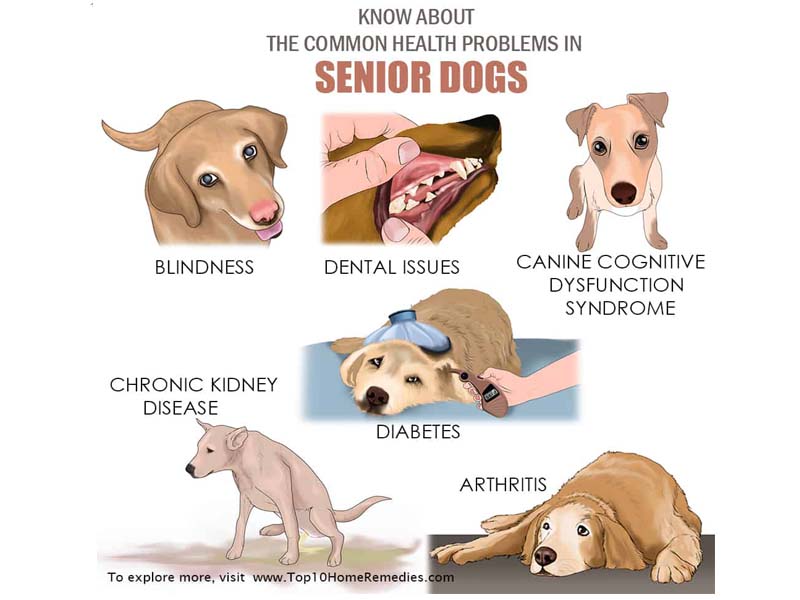Common Health Issues in Dogs
.jpeg)
While many dog owners will agree that having a pet is a joy and a privilege, it is not always sunshine and rainbows.
With so many different breeds, ages, and temperaments, dogs can be affected by any number of health issues over their lifetime.
Different breeds of dogs are more prone to certain health issues than others.
For example, bulldogs are especially susceptible to eye problems such as cataracts.
A small dog like a Chihuahua may experience more joint pain than a larger breed because of the increased weight on their tiny bodies.
Genetic predisposition aside, dogs can also experience ailments based on their lifestyle.
For example, if your dog is very active and plays hard or runs all day long, he may be more likely to suffer from joint problems later in life than a sedentary dog.
If your dog lives outside in colder climates, he may be predisposed to skin conditions that arise when his fur is wet for long periods (such as hypothermia).
Labradors are prone to several health issues. Since they are such large dogs, they are more likely to have hip dysplasia and elbow dysplasia than smaller breeds. Both of these conditions affect the joints and cartilage, leading to pain and lameness.
Labradors also suffer from obesity, when they don't get enough exercise and their diet is too rich. These dogs mustn't get too heavy, or it can worsen conditions such as elbow and hip dysplasia.
Cataracts affect many older Labradors but can occur in younger dogs as well. Some Labradors are also prone to retinal atrophy, especially those with a family history of the condition.
Hip dysplasia is commonly found in many dog breeds, but it is especially prevalent in German shepherds.
Hip dysplasia occurs when the ball-and-socket joint of the femur and hip do not fit snugly together. Over time, this can lead to severe pain and arthritis in dogs.
Bloat, also known as gastric dilatation-volvulus (GDV), is a life-threatening condition that occurs when the stomach fills with air or gas and begins to twist on itself.
Bloat causes significant discomfort for dogs, who may pant, drool excessively or pace around nervously.
If left untreated in time, bloat can cause shock and death within hours of symptoms appearing.
In general, Retrievers are healthy dogs with a long lifespan. However, they are also popular dogs, and therefore they are prone to certain inherited health problems.
Some Retrievers may be susceptible to eye disorders and hip dysplasia. Labrador Retrievers are more likely to develop hip dysplasia than the other two types of retrievers.
Retrievers are also prone to a condition called exercise-induced collapse (EIC).
This condition causes affected dogs to collapse after strenuous exercises, such as field trials or hunting trips.
Dogs with EIC will recover quickly if given time to rest. In some cases, EIC may be fatal, but this is rare.
In general, the Beagle is a healthy breed with an average life expectancy of 12 to 15 years. However, there are some health problems to be aware of.
Like most dogs, Beagles love food and will eat as much as you give them. This can lead to obesity, which increases the risk of heart disease and arthritis.
Beagles tend to have floppy ears that don't allow airflow inside the ear canal very well, which can lead to moisture buildup and ear infections.
Dental disease is a common health problem in beagles. Feeding your dog dry food (kibble) helps keep their teeth clean by scraping away plaque and tartar as they chew.
Bulldogs
Bulldogs are prone to several health problems. This is not surprising considering their history and the way they look.
Bulldogs suffer from a lot of respiratory problems, because of their short snouts.
Some Bulldogs are allergic to certain foods, or even airborne allergens such as pollens or molds.
This can lead to such symptoms as itchiness that can often become severe and cause the dog a lot of misery.
Cherry Eye is a condition in which one of the dog's eyelids turns inside out, making it very visible, and causing irritation and discomfort.
Because of all the wrinkles on their bodies, Bulldogs are prone to skin infections which may require medical attention to heal properly.
Bulldogs can get respiratory problems because of the shape of their head and the structure of their throat.
They can also develop spinal problems and brachycephalic syndrome.
Health Concerns in Small Dogs
Small dogs are often thought of as more likely to be healthy than their larger cousins, but that isn't always the case.
Small dog breeds often have a problem called luxating patellas, or kneecaps that dislocate.
It's a condition that usually begins with the kneecap moving slightly out of place and then slipping back into place.
Small dog syndrome is a behavior issue in which small dog owners tend to treat their pets like human children instead of a canine.
The result is often an aggressive little dog who bites when he doesn't get his way.
A trachea that's weakened for whatever reason can cause problems breathing in some small dogs, especially brachycephalic breeds — those dogs with short noses, such as Pugs and Boston terriers.
It's most common in middle-aged to older dogs but can sometimes occur in younger ones as well.
It ranges from mild to severe and may require medication or even surgery to alleviate the symptoms.
Dental disease is the most common chronic problem in pets, affecting 80 percent of all dogs by age two.
Since smaller dogs have fewer jawbones to support their teeth, their teeth are more crowded and crooked, which makes them harder to keep clean and increases the risk of periodontal disease.
Legg-Perthes disease is another condition that is characterized by degeneration of the hip joint. It's most common in toy breeds like Maltese, Shih Tzus, and Poodles.
Health Concerns in Large Dogs
A big concern for giant breeds is bone cancer. This is the most common type of cancer found in these dogs; it usually affects the bones of the legs and spine.
The disease is often treated with amputation or chemotherapy.
Another dog health problem that's common in large breeds is hip dysplasia.
This condition generally occurs when the socket part of the hip joint doesn't properly cover the ball portion of the thigh bone. When this happens, there's a loss of friction between bones, which causes pain and lameness in the hind legs.
Some cases can be treated with anti-inflammatory drugs, but others require surgery to correct.
The third major problem for large dogs is gastric torsion or bloat (GDV). This involves an accumulation of gas that causes distention and twisting of the stomach. It can be life-threatening if not corrected quickly with emergency surgery.
Puppy Health Issues
It's always a cause for celebration when a new puppy comes home. But along with the fun and excitement, there may also be a few puppy health issues to address.
Parvo is a deadly stomach virus that attacks puppies whose immune systems have not yet matured, usually between 4 and 12 weeks old.
Parvo symptoms include severe diarrhea and vomiting; lack of appetite; fever; and dehydration. Parvovirus is extremely contagious and often fatal if left untreated.
Intestinal parasites can cause diarrhea and vomiting and make your puppy sick. Hookworms and roundworms are particularly likely to infect puppies before they're 6 months old.
Diarrhea is another common disease in puppies. The puppy has loose stools that are watery and foul-smelling. It may be accompanied by vomiting, fever, and a dull coat.
Distemper is another viral disease that can cause respiratory problems and neurological disorders in puppies.
Because it can be fatal, it's important to keep up with the puppy's vaccinations.
The vaccine is usually given around 6 to 8 weeks old and again every three to four weeks until the puppy is 16 weeks old or older.
Like parvovirus, this disease is spread through contact with bodily fluids, such as saliva or urine, so puppies that aren't confined at home are at high risk of infection.
Apart from these, fleas and ticks, puppy teething, injury from falling or jumping off high furniture, etc., are some common issues that puppies face.
Adult Dog Health Issues
As your dog ages, he will be less active and may begin to gain weight. Your dog's health is important at any age, but as a dog begins to age, certain health issues may arise.
Dogs aged between four and seven are also prone to developing diseases of the thyroid gland, so if you notice any changes in your dog's coat or appetite, consult your vet.
One of the greatest risks to your dog's health and lifespan is obesity.
Just like people, overweight dogs are more prone to develop diabetes, joint problems, heart disease, and cancer.
By keeping your dog at a healthy weight, you can help prevent these health problems from developing.
There are several eye diseases that an adult dog faces as it ages.
Some of them are Progressive Retinal Atrophy (PRA), a group of diseases that cause the retina to degenerate, eventually causing blindness.
Cataracts are cloudiness in the lens of the eye that causes blindness. Dog cataracts usually occur in older dogs and can sometimes be removed surgically.
Corneal Ulcers. an erosion or break in the outer coating of the eyeball that causes pain and sensitivity to light.
Entropion & Ectropion, turning in or out of eyelids. These conditions can be inherited and cause irritation or damage to the cornea (the clear part of the eyeball) when a dog blinks.

Keeping your Dogs Healthy and Active
A healthy dog is a happy dog. A healthy dog is going to live a longer, more active life and enjoy spending time with you.
The best way to keep your dog healthy and active is to make sure they're getting proper nutrition.
As a pet owner, it is your job to make sure your pet eats right, gets enough exercise, and stays out of harm's way.
The simplest way to exercise your dog is also one of the best ways to bond with your dog. Just going out for a walk together each day will help keep your dog fit and healthy.
Dogs also need a healthy diet. Feed them food that is high in protein and low in carbohydrates such as meat, fish, eggs, vegetables, and fruits.
Toys can also help keep dogs physically and mentally stimulated. It keeps their mind busy in trying to figure out how to get the treats inside the toy.
Many dogs live well into their teens, but even a few health problems can make that timeless enjoyable for both of you.
Learn how to spot signs of illness in your dog so you can get veterinary care as soon as possible and keep them on supplements if needed.
Frequently Asked Questions
What is the most common health problem for dogs?
The most common dog health problems are:
- gum disease.
- ear infections.
- obesity.
- overgrown nails.
- anal sac impaction.
Are smaller dogs more prone to illness?
Smaller dogs tend to exhibit more behavior problems than large dogs, and the need for veterinary behavior consultations may therefore increase in the future.
.jpeg) Published By:
Published By: Admin
Published On: 23-April-2022

 0
0 



.jpeg)




